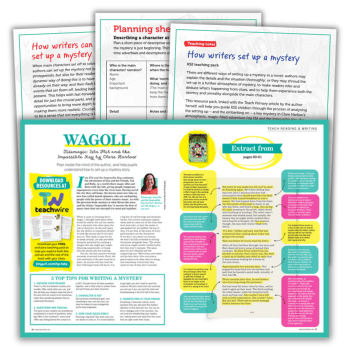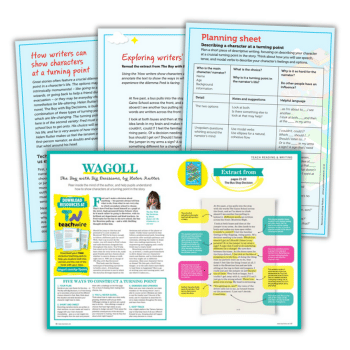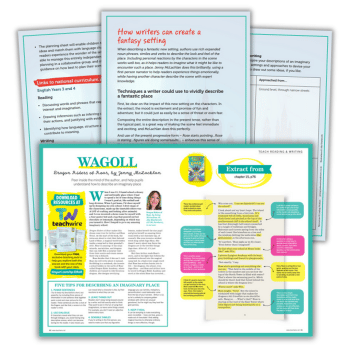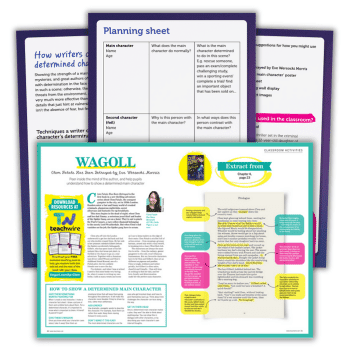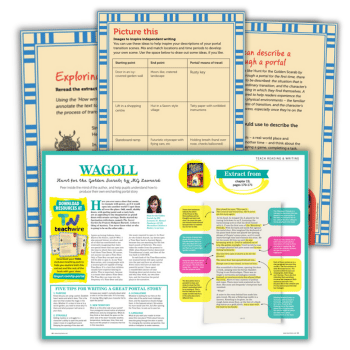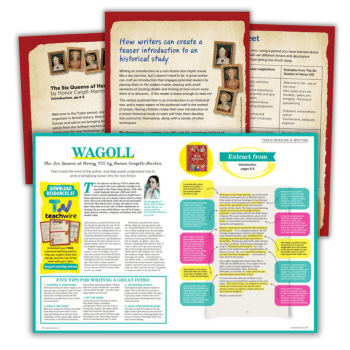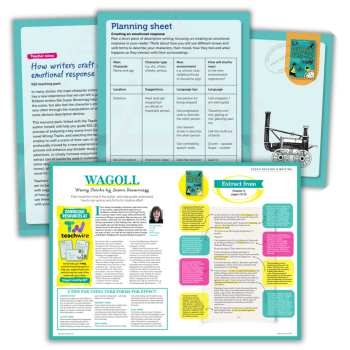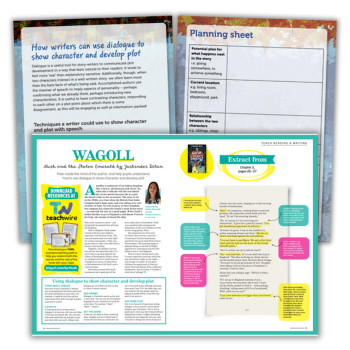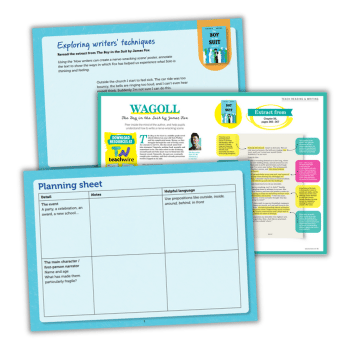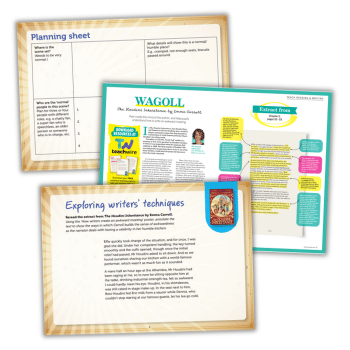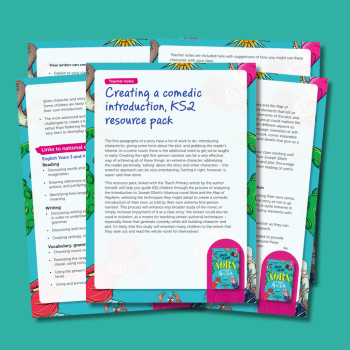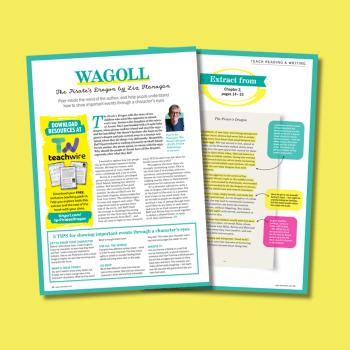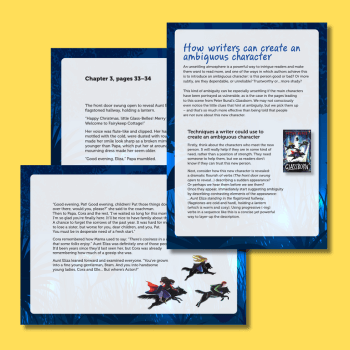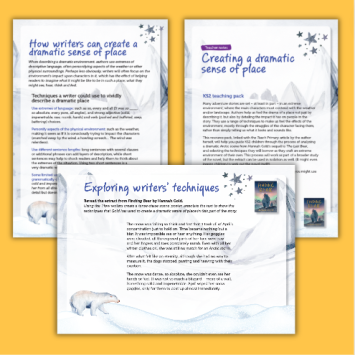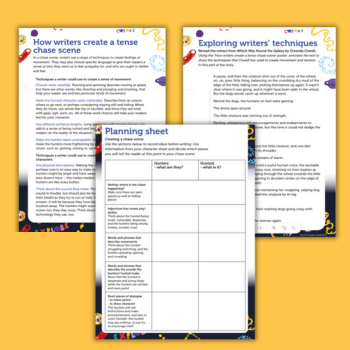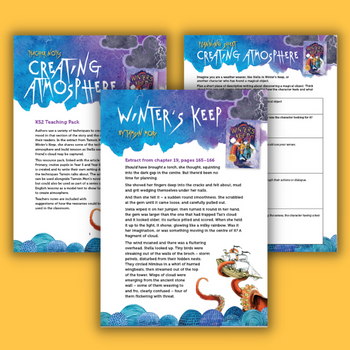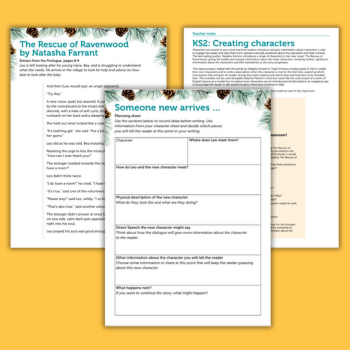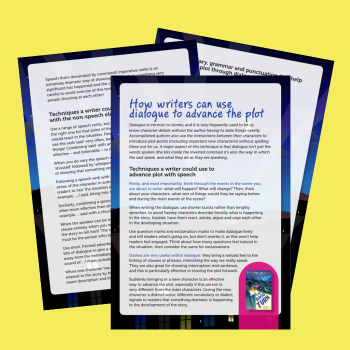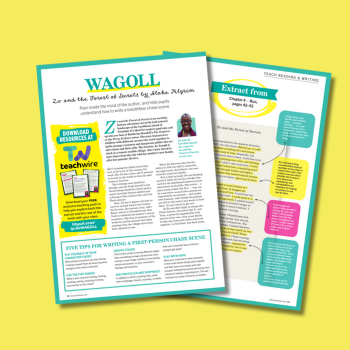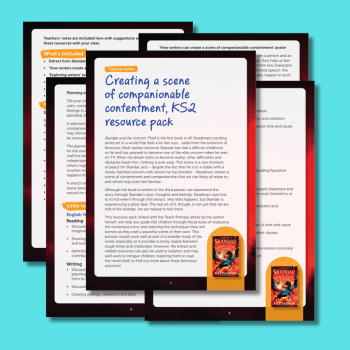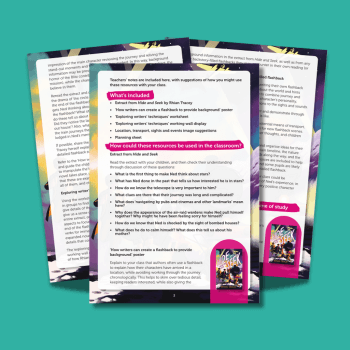WAGOLL – Meaning, resources & how to write your own
We explore the meaning of WAGOLL, share valuable classroom resources to support your teaching and provide a stress-free guide on how to write your own model texts…
WAGOLL meaning
What does WAGOLL mean? It’s an acronym that stands for ‘What a good one looks like’. It’s basically an example or model text to show students one way of creating a good piece of work. If you teach using Talk4Writing, you might know them as model texts.
WAGOLL classroom resources

Peer inside the mind of award-winning authors and help pupils understand how to create engaging characters, captivating atmospheres and suspenseful situations with our collection of free WAGOLL resource packs for primary (above!).
Each teaching pack contains:
- exclusive extract
- working wall template
- teaching notes
- worksheets
We have WAGOLL model texts focusing on:
- first-person writing (Zo and the Forest of Secrets by Alake Pilgrim; The Boy with Big Decisions by Helen Rutter)
- narrative writing (The Pirate’s Dragon by Liz Flanagan and Skandar and the Unicorn Thief by A.F. Steadman)
- writing dialogue (The Good Turn by Sharna Jackson and Nush and the Stolen Emerald by Jasbinder Bilan)
- writing flashbacks (Hide and Seek by Rhian Tracey and Tidemagic: Ista Flit and the Impossible Key by Clare Harlow)
- comedy writing (Nora and the Map of Mayhem by Joseph Elliot)
- writing awkward encounters (The Houdini Inheritance by Emma Carroll)
- powerful verbs (Wrong Tracks by Susan Brownrigg)
- non-fiction writing (The Six Queens of Henry VIII by Honor Cargill-Martin)
- portal stories (Hunt for the Golden Scarab by MG Leonard)
Creating suspense, tension and atmosphere
- suspense writing (Which Way Round the Galaxy by Cressida Cowell)
- creating atmosphere (Winter’s Keep by Tamsin Mori)
- building tension (The Boy in the Suit by James Fox)
- horror writing (Fear Files: Hide & Seek by Christopher Edge)
Description
- character description (Glassborn by Peter Bunzl; Clem Fatale Has Been Betrayed by Eve Wersocki Morris and The Rescue of Ravenwood by Natasha Farrant)
- setting description (Finding Bear by Hannah Gold)
- fantasy setting description (Dragon Riders of Roar by Jenny McLachlan)
Real Writing from Plazoom
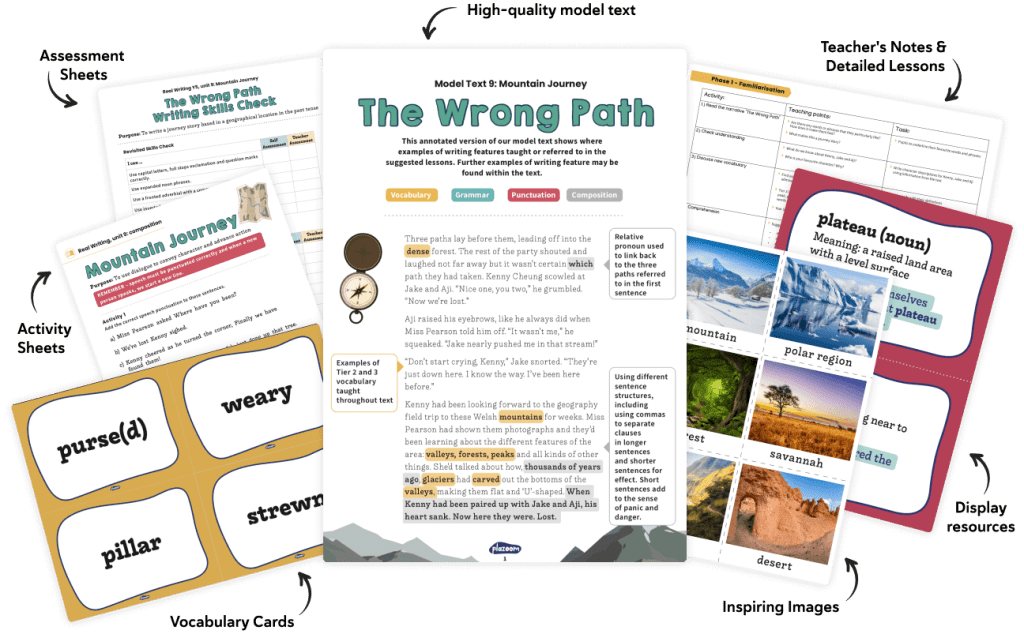
Real Writing is a complete writing curriculum from Plazoom that puts high-quality WAGOLL model texts at the heart of great literacy teaching. It’s built on a comprehensive, curriculum-linked framework devised by the literacy consultant Rachel Clarke. It covers the full writing programme of study for Years 1-6.
The resources allow you to:
- Model great writing with high-quality texts written by celebrated children’s authors
- Ensure rapid progress with exciting cross-curricular themes and topics
- Deliver effective literacy lessons with easy-to-follow teaching sequences
- Save hours of preparation time with ready-made pupil resources
Download free Real Writing sample units for Year 2, 4 and 6 to try out with your class.
Pie Corbett Ultimate KS2 Fiction Collection
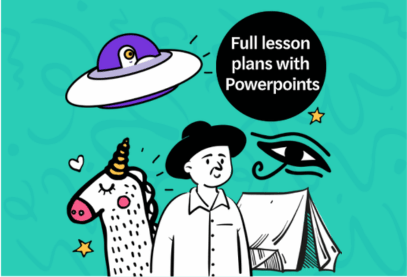
Our free Pie Corbett Ultimate KS2 Fiction Collection contains 20+ fictional stories written by Pie Corbett. Use the story and the accompanying lesson plan to inspire children to write their own versions. Topics covered include:
- Suspense writing
- Adventure stories
- Dialogue
- Portal stories
- Mystery stories
We also have free non-fiction and poetry collections from Pie Corbett.
WAGOLL text types writing packs
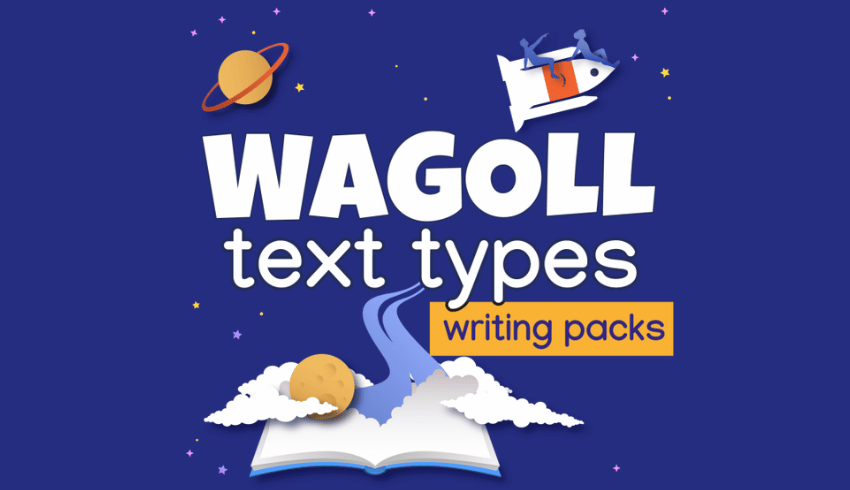
Support pupils when writing across a whole range of text types and genres with these engaging writing packs for KS1, LKS2 and UKS2 from Plazoom.
The downloads feature:
- WAGOLL model texts
- Word mats
- Worksheets
- Planning guides
- Writing templates
- Themed paper
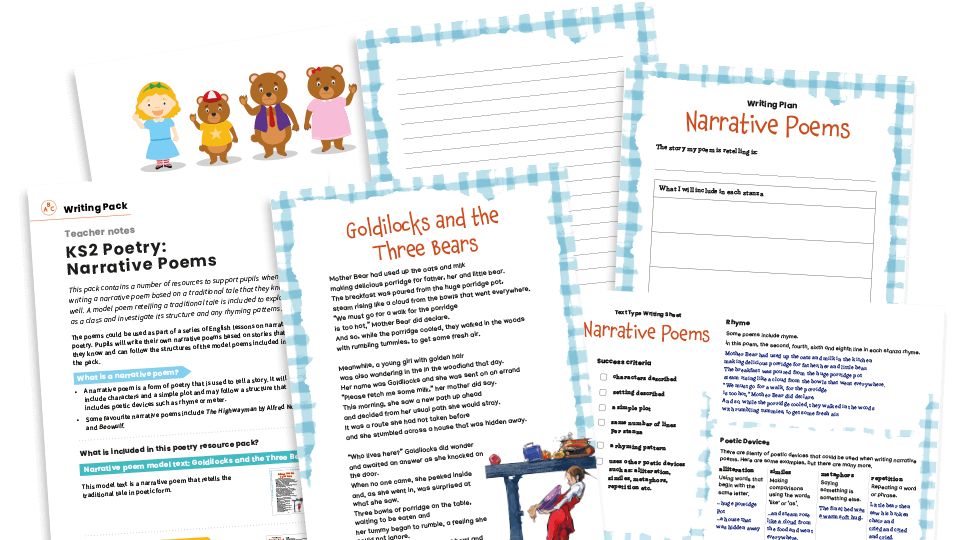
Each one focuses on a particular kind of text, encouraging children to make appropriate vocabulary, register and layout choices. You can use the writing pupils produce as evidence of progress.
How to write your own WAGOLL (without the stress)
Dropping Little Red Riding Hood into Ancient Egypt could be just the spark you need to get typing your own content, explains Matt Beighton…
I carried out a survey as research for my book Write It Level It Teach It, which highlighted some interesting trends among the teachers who took part.
Most teachers graded their confidence when creating content as about 3/5, or below. 69% were spending at least an hour writing a text for their class.
The main concerns were generating ideas, including grammar objectives and ensuring they were at an appropriate reading level.
Pupils in your class will consume more of your content than that of any other author. If you are creating WAGOLLs a few times a week, you are already guiding their reading experience. It’s right that you want to make it an effective and efficient process.
So, here are five things to consider when creating your WAGOLL:
1 Get the hook right
Your content doesn’t need to ‘tie in’. Hear me out. Coming up with an idea that will hook your class is probably the most important part of the whole process.
Your pupils might be totally immersed in the life of Victorian children, and your linked reading text might engage every one of them. Realistically, though, you probably have a group, however small, who are struggling to invest.
Getting the hook right for your class is going to have more impact than ensuring it is linked to a topic. Writing a WAGOLL focused on something that captivates your whole class will increase engagement.
2 Include real people
If children see people they know appearing in your WAGOLL text, I guarantee they will be more interested. Instead of a letter from a child trapped in a workhouse, consider a letter home from the premises officer trapped in the school by a forgetful head who’s left for the holidays.
A mystery with a lunchtime supervisor at the centre is a great way to not only grab your children’s attention, but encourage them to engage with other members of the school community.
3 Write for a purpose
If you take Little Red Riding Hood and replace her with an Ancient Egyptian slave, you can create a simple narrative. The wolf could become the Sphinx, and the delivery of food to Grandma an important document to the High Priest.
You can then take any part of this story and write it for a purpose: the meeting with the wolf/Sphinx could be a diary entry. The delivery of the food/document could be a newspaper report, and so on.
This works for non-fiction, too. Little Red could be Ernest Shackleton. The food, his quest to reach the South Pole. The wolf, the harsh weather.
If you use the same language that you would for the wolf (stalk, lurk, pounce, creep) to describe the weather, it becomes a great example of personification.
4 Check reading levels
KS2 SATs papers have been consistently at a Year 6 and above reading age. If a Year 6 class are only accessing texts at a Year 4 level, they are at a disadvantage.
Most KS2 reading books have a reading age of Year 4, so you can’t rely on them for exposure; it has to come from somewhere else. Renaissance, the company behind Accelerated Reader, has a free online tool that will tell you the reading level of any text or any book.
5 Adapt model texts
All of this sounds daunting, but it doesn’t need to be. There are lots of great WAGOLL resources out there to download and use. They are great time savers. In fact, if you use them as a source of ideas for your own writing, they can be a great tool.
You can download these as they are to use. But if you can use them as inspiration for your own writing, you will end up with a resource that is uniquely tailored to your class and their needs.
3 steps to an engaging text
- Remember the mantra: purpose, purpose, purpose
Does the text need to inform? Will it provide a structural scaffold? Are you trying to demonstrate particular grammar objectives? - Less is more
If it’s a scaffold, it probably doesn’t need so many extra grammar objectives. If its purpose is to inform about a topic, are you adding to your stress levels by trying to include passive voice? Not only are you increasing your own workload, you are also muddying the water for the children. They will be looking to the WAGOLL for guidance in one form or another, and if you aren’t clear on what its purpose is, there’s a good chance that they won’t be either. - Make a note of how long it’s taking you
Remember, at the end of the unit, your pupils are only going to be given 40 minutes or so to write their own text. If it’s taking you over an hour, they probably won’t be able to do it in less. If you’re not expecting the children to include something, then don’t worry if you don’t either.
Matt Beighton is an experienced primary teacher turned full-time children’s writer. Matt now splits his time between writing his Monstacademy and Pick Your Path gamebook adventures, writing for The Literacy Shed and running writing workshops in schools.






